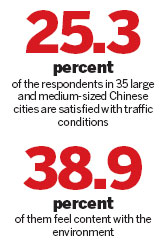Society
City life no smooth ride as growth skyrockets
By Cang Wei (China Daily)
Updated: 2011-05-07 07:45
 |
Large Medium Small |

BEIJING - Rapid urbanization in China has created an increasing number of problems, ranging from traffic congestion, environmental pollution, urban disasters to a diminished sense of security, a report by the country's top think tank warned on Friday.
According to the 2011 Blue Book of Urban Competitiveness released by the Chinese Academy of Social Sciences, China's urbanization is not fully developed and is of poor quality.
"Many Chinese people moving into cities face severe problems, emerging from excessive urbanization, before they enjoy the benefits of being urbanites," said Ni Pengfei, director of the city and competitiveness research center under the Chinese Academy of Social Sciences.
Only 25.3 percent of the respondents in 35 large and medium-sized Chinese cities are satisfied with traffic conditions, the report said, and only 38.9 percent of them feel content with the environment.
"The environmental pollution in many small cities is even worse than that of Beijing," said Sun Jiuwen, director of the institute of regional and urban economics under Renmin University of China.
"Every day I have to spend almost three hours in traffic," said Xu Yue, a Beijing resident. "I would be able to enjoy my life much better if I spent less time in traffic."
Also, urban residents face pressure from poverty, unemployment, crime, limited medical services and urban disasters such as fires in high-rise buildings, the report said.
Fake urbanization is another problem facing China, Sun said as "some local governments just move farmers into cities only to increase the urbanization rate but without solving related problems".
About 49 percent of Chinese people now live in cities, said Li Yang, vice-president of the Chinese Academy of Social Sciences. According to the National Bureau of Statistics, the country's urbanization rate was 46.6 percent in 2009.
Chinese people's happiness in some cities, especially large ones, is also declining, the report said.
"Although people's rating of their happiness is subjective, the government's provision of a comprehensive public service system is the objective basis for them to be able to gain happiness," said Ni.
Problems caused by excessive urbanization should be one of the priorities of the government, Ni said. He suggested that the government should change policies that further differentiate between rural and urban areas, and invest more in less developed regions.
Improving urban infrastructure and promoting equal public services between rural and urban areas are also required, he said.
China Daily
(China Daily 05/07/2011 page3)
| 分享按鈕 |